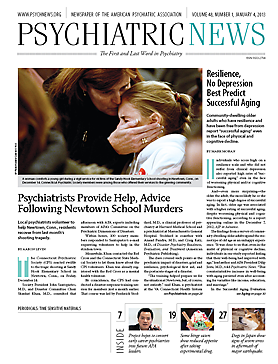The APA practice guideline on the treatment of eating disorders, originally issued in 2006, is still current and can be regarded by clinicians as valid.
That was the determination of an expert panel led by Joel Yager, M.D., chair of the APA Steering Committee on Practice Guidelines. Their review of the practice guideline and recent treatment research are available on APA’s Web site under the title “Guideline Watch: Practice Guideline for Treatment of Patients With Eating Disorders–Third Edition.”
Yager’s coauthors are Michael Devlin, M.D., Katherine Halmi, M.D., David Herzog, M.D., James Mitchell III, M.D., Pauline Powers, M.D., and Katherine Zerbe, M.D.
The sole problem in the guideline is a recommendation for use of sibutramine for the treatment of binge-eating disorder. But since the guideline was issued, the Food and Drug Administration has withdrawn approval for sibutramine because clinical trials showed increased risk of heart attack and stroke. Also, the manufacturer, Abbott Laboratories, subsequently withdrew this medication from the U.S. market, Yager said.
Guideline watches summarize significant developments in practice that have occurred since publication of an APA practice guideline. Watches may be written and reviewed by experts associated with the original guideline development and are approved for publication by APA’s Executive Committee on Practice Guidelines. Thus, watches represent the opinion of the authors and have the approval of the Executive Committee but are not APA policy.
Yager added that in their review of the practice guideline, he and fellow authors anticipated changes in criteria that were proposed for eating disorders in the new DSM-5 and that have since been approved by the APA Board of Trustees—and found that the changes in diagnostic criteria do not affect the validity of the practice guideline.
For the practice guideline watch, Yager and colleagues searched MEDLINE, using PubMed, for randomized, controlled trials and meta-analyses published from 2003 through December 13, 2011, searching on words related to eating disorders. The search yielded 1,346 articles; of these, 693 were rejected as not relating to treatment of eating disorders.
They retained and reviewed 91 articles pertaining to anorexia nervosa, 84 to bulimia nervosa, 95 to binge eating, 12 to osteoporosis treatment in eating disorders, and 60 to miscellaneous topics, most of which covered more than one eating disorder. The watch reviews literature pertaining to anorexia, bulimia, binge-eating disorder, and eating disorders in middle age and later life.
Yager said other practice-guideline watches that are being readied for publication include reviews of guidelines for obsessive-compulsive disorder and for Alzheimer’s and related disorders.
“The purpose of the guideline watch is to review evolving literature related to a guideline and to bring to the attention of clinicians the advances that have been made in the field,” Yager said. “We want to examine how a practice guideline has stood the test of time and to provide clinicians with important updates.” ■
